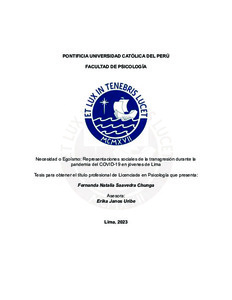| dc.contributor.advisor | Janos Uribe, Erika | |
| dc.contributor.author | Saavedra Chunga, Fernanda Natalia | |
| dc.date.accessioned | 2024-01-30T17:42:52Z | |
| dc.date.available | 2024-01-30T17:42:52Z | |
| dc.date.created | 2023 | |
| dc.date.issued | 2024-01-30 | |
| dc.identifier.uri | http://hdl.handle.net/20.500.12404/26985 | |
| dc.description.abstract | La transgresión es una de las principales problemáticas del Perú, basada en un pensamiento
social y expresada en un amplio espectro de comportamiento transgresor, que en el contexto de
pandemia del COVID-19 podría haber puesto en peligro la salud del país. Por ello se considera
importante conocer los elementos psicosociales que forman las representaciones sociales
asociadas a ella, para así obtener una mayor comprensión de la problemática. El objetivo del
estudio fue identificar los elementos que conforman la representación social que jóvenes de clase
media poseen con respecto a la transgresión de las normas en el contexto de pandemia del
COVID-19 en Lima. El diseño fue cualitativo desde una metodología fenomenológica con una
lógica inductiva, realizando cuatro grupos focales de 3 participantes cada uno. En total
participaron 6 adultas y 6 adultos jóvenes de nivel socioeconómico medio y alto seleccionados
intencionalmente. Se identificaron dos tipos de transgresiones: transgresiones necesarias, y
transgresiones que ponen en riesgo la salud de otros, las cuales varían en gravedad. Los
resultados indicaron que la percepción de una falta de coherencia de las normas, la falta de
castigo de la transgresión, y la desigualdad en la aplicación y sanción de las normas son
percibidas como elementos que caracterizan y definen el concepto de transgresión en el contexto
de pandemia del covid-19. Al respecto, los resultados muestran que se atribuye la transgresión
principalmente a la necesidad o al egoísmo, dependiendo del conjunto de características
sociodemográficas de quién transgrede. Se propone que esto promueve la creación de normas
alternativas y aumenta la desconfianza institucional. | es_ES |
| dc.description.abstract | Transgression is one of the main problems in Peru, based on social thought and expressed in a
wide spectrum of transgressive behavior, which in the context of the COVID-19 pandemic could
have endangered the health of the country. For this reason, it is considered important to know the
psychosocial elements that form the social representations associated with it, in order to obtain a
better understanding of the problem. The objective of the study was to identify the elements that
make up the social representation that middle-class youth have regarding the transgression of the
rules in the context of the COVID-19 pandemic in Lima. The design was qualitative from a
phenomenological methodology with an inductive logic, carrying out four focus groups of 3
participants each. A total of 6 female and 6 male young adults of medium and high
socioeconomic level intentionally selected participated. Two types of violations were identified:
necessary violations, and violations that put the health of others at risk, which vary in severity.
The results indicated that the perception of a lack of coherence of the norms, the lack of
punishment of the transgression, and the inequality in the application and sanction of the norms
are perceived as elements that characterize and define the concept of transgression in the context
of the covid-19 pandemic. In this regard, the results show that the transgression is attributed
mainly to necessity or selfishness, depending on the set of sociodemographic characteristics of
who transgresses. It is proposed that this promotes the creation of alternative norms and
increases institutional mistrust. | es_ES |
| dc.language.iso | spa | es_ES |
| dc.publisher | Pontificia Universidad Católica del Perú | es_ES |
| dc.rights | info:eu-repo/semantics/openAccess | es_ES |
| dc.rights.uri | http://creativecommons.org/licenses/by-nc-sa/2.5/pe/ | * |
| dc.subject | Pandemia de COVID-19, 2020---Aspectos psicológicos--Perú | es_ES |
| dc.subject | Representaciones sociales | es_ES |
| dc.subject | Transgresión (Ética)--Aspectos psicológicos | es_ES |
| dc.subject | Jóvenes--Perú--Lima--Investigaciones | es_ES |
| dc.title | Necesidad o Egoísmo: Representaciones sociales de la transgresión durante la pandemia del COVID-19 en jóvenes de Lima | es_ES |
| dc.type | info:eu-repo/semantics/bachelorThesis | es_ES |
| thesis.degree.name | Licenciado en Psicología | es_ES |
| thesis.degree.level | Título Profesional | es_ES |
| thesis.degree.grantor | Pontificia Universidad Católica del Perú. Facultad de Psicología | es_ES |
| thesis.degree.discipline | Psicología | es_ES |
| renati.advisor.dni | 46868636 | |
| renati.advisor.orcid | https://orcid.org/0000-0003-4273-7396 | es_ES |
| renati.author.dni | 70365968 | |
| renati.discipline | 313016 | es_ES |
| renati.juror | Janos Uribe, Erika | es_ES |
| renati.juror | Tintaya Orihuela, Meir Alvaro | es_ES |
| renati.juror | Frisancho Hidalgo, Susana del Mar | es_ES |
| renati.level | https://purl.org/pe-repo/renati/level#tituloProfesional | es_ES |
| renati.type | https://purl.org/pe-repo/renati/type#tesis | es_ES |
| dc.publisher.country | PE | es_ES |
| dc.subject.ocde | https://purl.org/pe-repo/ocde/ford#5.01.00 | es_ES |







